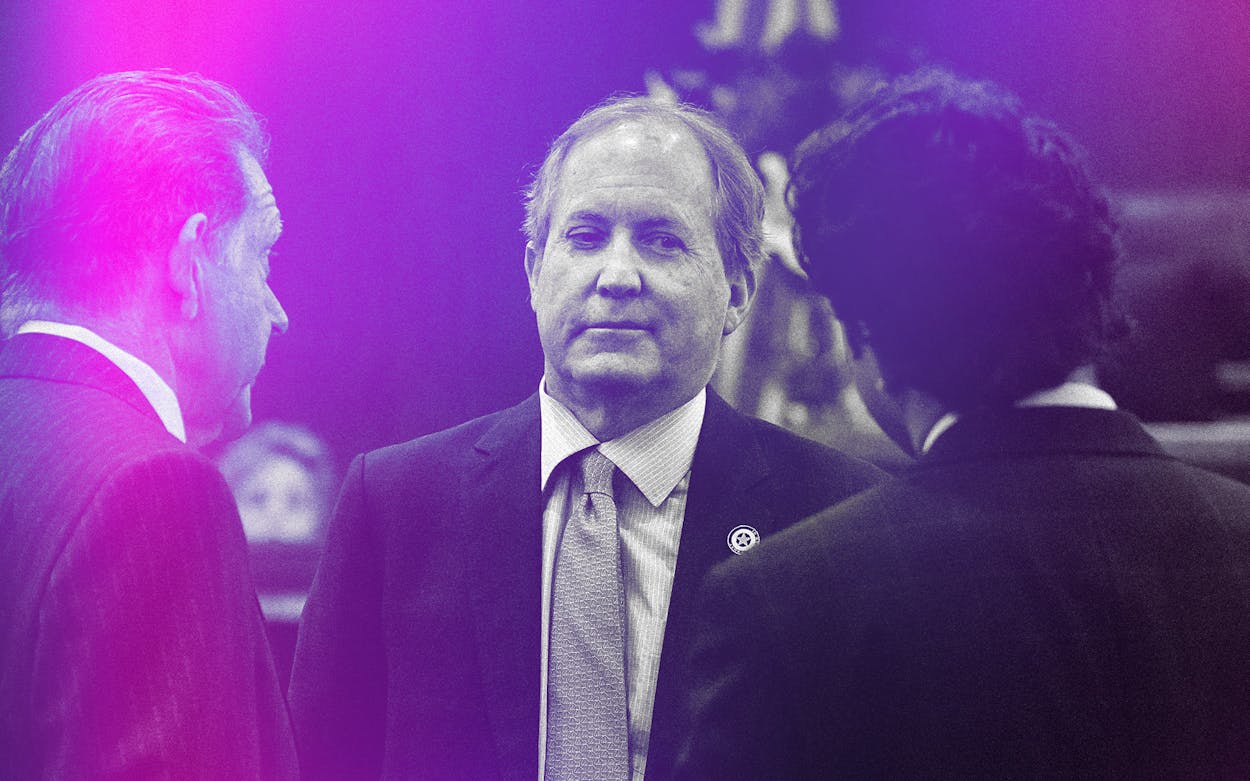The Catholic Diocese of El Paso loaned out a run-down, two-story red brick building on the city’s East San Antonio Avenue, ten blocks from the border with Mexico, to a group of five young parishioners who felt moved that “the gospel calls us all to [serve] the poor.” In El Paso, that often means asylum seekers and migrants, so providing them with food and shelter became the mission of the group, which created a nongovernmental organization called Annunciation House.
That was back in 1978, and in the decades since, Annunciation House quietly ministered to migrants without stirring controversy—until Tuesday. That’s when Attorney General Ken Paxton posted a tweet announcing a lawsuit against the NGO, declaring that such organizations “facilitate astonishing horrors including human smuggling” and decrying them as tools of the Biden administration tasked with perpetuating “the lawlessness destroying this country.”
The actual allegation in the lawsuit is a bit less dramatic than all of that. The “human smuggling” part of Paxton’s claim hinges on the fact that Annunciation House provides some of the folks it serves with transportation and that some of them are in El Paso without documentation. “Annunciation House knows that at least some of the aliens it provides services to are present illegally and are trying to avoid Border Patrol,” the suit alleges, and thus, “Annunciation House’s transportation of those aliens presents a very significant likelihood of human smuggling.”
Texas’s statute outlawing human smuggling is broad. It’s also distinct from the crime of human trafficking, though Paxton’s rhetoric around “astonishing horrors” seems to intentionally conflate the two. Human trafficking involves exploitation, coercion, and forced labor. In Texas, human smuggling—which the suit can only claim has some “likelihood” here—includes not just transporting migrants across the border, as the term “smuggling” would suggest, but also transporting them within the U.S. or inducing them to remain in the country. (As legal experts have pointed out, Governor Greg Abbott’s system of busing undocumented migrants to U.S. cities outside Texas could fall afoul of the law, as a free bus ticket to Chicago or Washington, D.C., could constitute such an inducement.)
No evidence cited in Paxton’s lawsuit meets the level of “astonishing horror.” We’re talking about driving people around El Paso in vans a few times a week. As a press release from the organization contends, “Annunciation House has kept hundreds of thousands of refugees coming through our city off the streets and given them food,” and the evidence cited in Paxton’s lawsuit doesn’t demonstrate anything more sinister than that.
According to Annunciation House’s press release, the lawsuit stems from a specific dispute between the nonprofit and Paxton’s office: on February 7, a division of Paxton’s office demanded the organization immediately release detailed records on its clients; Annunciation House filed suit, requesting that a judge review the attorney general’s office’s demand and weigh in on what information it was required to release. The organization also sought a restraining order against Paxton’s office. The attorney general responded by filing suit to revoke the organization’s business registration as a nonprofit in the state of Texas.
NGOs can be unpopular with government officials in some political environments. In 2012, for example, Russian officials passed a “foreign agents” law, forcing out NGOs objectionable to the Putin regime; in 2017, Egyptian authoritarian president Abdel Fattah el-Sisi signed a similar law, restricting NGOs engaged in human rights work. Paxton’s attempt to punish an organization providing services to vulnerable folks in the community may be new to Texas, in other words, but it’s not without precedent.
- More About:
- Politics & Policy
- Refugees
- Ken Paxton
- El Paso








